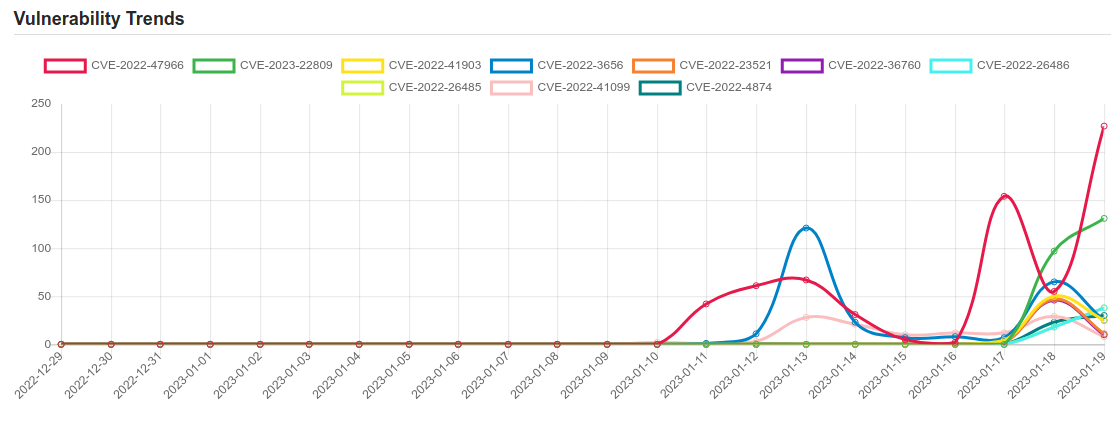Daily Vulnerability Trends: Fri Jan 20 2023

| CVE NAME | CVE Description |
| CVE-2022-44877 | login/index.php in CWP (aka Control Web Panel or CentOS Web Panel) 7 before 0.9.8.1147 allows remote attackers to execute arbitrary OS commands via shell metacharacters in the login parameter. |
| CVE-2022-42475 | A heap-based buffer overflow vulnerability [CWE-122] in FortiOS SSL-VPN 7.2.0 through 7.2.2, 7.0.0 through 7.0.8, 6.4.0 through 6.4.10, 6.2.0 through 6.2.11, 6.0.15 and earlier and FortiProxy SSL-VPN 7.2.0 through 7.2.1, 7.0.7 and earlier may allow a remote unauthenticated attacker to execute arbitrary code or commands via specifically crafted requests. |
| CVE-2022-3236 | A code injection vulnerability in the User Portal and Webadmin allows a remote attacker to execute code in Sophos Firewall version v19.0 MR1 and older. |
| CVE-2023-21835 | Vulnerability in the Oracle Java SE, Oracle GraalVM Enterprise Edition product of Oracle Java SE (component: JSSE). Supported versions that are affected are Oracle Java SE: 11.0.17, 17.0.5, 19.0.1; Oracle GraalVM Enterprise Edition: 20.3.8, 21.3.4 and 22.3.0. Easily exploitable vulnerability allows unauthenticated attacker with network access via DTLS to compromise Oracle Java SE, Oracle GraalVM Enterprise Edition. Successful attacks of this vulnerability can result in unauthorized ability to cause a partial denial of service (partial DOS) of Oracle Java SE, Oracle GraalVM Enterprise Edition. Note: This vulnerability applies to Java deployments, typically in clients running sandboxed Java Web Start applications or sandboxed Java applets, that load and run untrusted code (e.g., code that comes from the internet) and rely on the Java sandbox for security. This vulnerability does not apply to Java deployments, typically in servers, that load and run only trusted code (e.g., code installed by an administrator). CVSS 3.1 Base Score 5.3 (Availability impacts). CVSS Vector: (CVSS:3.1/AV:N/AC:L/PR:N/UI:N/S:U/C:N/I:N/A:L). |
| CVE-2016-2147 | Integer overflow in the DHCP client (udhcpc) in BusyBox before 1.25.0 allows remote attackers to cause a denial of service (crash) via a malformed RFC1035-encoded domain name, which triggers an out-of-bounds heap write. |
| CVE-2022-3626 | LibTIFF 4.4.0 has an out-of-bounds write in _TIFFmemset in libtiff/tif_unix.c:340 when called from processCropSelections, tools/tiffcrop.c:7619, allowing attackers to cause a denial-of-service via a crafted tiff file. For users that compile libtiff from sources, the fix is available with commit 236b7191. |
| CVE-2023-21674 | Windows Advanced Local Procedure Call (ALPC) Elevation of Privilege Vulnerability. |
| CVE-2014-0107 | The TransformerFactory in Apache Xalan-Java before 2.7.2 does not properly restrict access to certain properties when FEATURE_SECURE_PROCESSING is enabled, which allows remote attackers to bypass expected restrictions and load arbitrary classes or access external resources via a crafted (1) xalan:content-header, (2) xalan:entities, (3) xslt:content-header, or (4) xslt:entities property, or a Java property that is bound to the XSLT 1.0 system-property function. |
| CVE-2023-22809 | In Sudo before 1.9.12p2, the sudoedit (aka -e) feature mishandles extra arguments passed in the user-provided environment variables (SUDO_EDITOR, VISUAL, and EDITOR), allowing a local attacker to append arbitrary entries to the list of files to process. This can lead to privilege escalation. Affected versions are 1.8.0 through 1.9.12.p1. The problem exists because a user-specified editor may contain a “–” argument that defeats a protection mechanism, e.g., an EDITOR=’vim — /path/to/extra/file’ value. |
| CVE-2022-41903 | Git is distributed revision control system. `git log` can display commits in an arbitrary format using its `–format` specifiers. This functionality is also exposed to `git archive` via the `export-subst` gitattribute. When processing the padding operators, there is a integer overflow in `pretty.c::format_and_pad_commit()` where a `size_t` is stored improperly as an `int`, and then added as an offset to a `memcpy()`. This overflow can be triggered directly by a user running a command which invokes the commit formatting machinery (e.g., `git log –format=…`). It may also be triggered indirectly through git archive via the export-subst mechanism, which expands format specifiers inside of files within the repository during a git archive. This integer overflow can result in arbitrary heap writes, which may result in arbitrary code execution. The problem has been patched in the versions published on 2023-01-17, going back to v2.30.7. Users are advised to upgrade. Users who are unable to upgrade should disable `git archive` in untrusted repositories. If you expose git archive via `git daemon`, disable it by running `git config –global daemon.uploadArch false`. |
| CVE-2022-3656 | Insufficient data validation in File System in Google Chrome prior to 107.0.5304.62 allowed a remote attacker to bypass file system restrictions via a crafted HTML page. (Chromium security severity: Medium) |
| CVE-2022-36760 | Inconsistent Interpretation of HTTP Requests (‘HTTP Request Smuggling’) vulnerability in mod_proxy_ajp of Apache HTTP Server allows an attacker to smuggle requests to the AJP server it forwards requests to. This issue affects Apache HTTP Server Apache HTTP Server 2.4 version 2.4.54 and prior versions. |
| CVE-2022-41099 | BitLocker Security Feature Bypass Vulnerability. |
| CVE-2022-4874 | Authentication bypass in Netcomm router models NF20MESH, NF20, and NL1902 allows an unauthenticated user to access content. In order to serve static content, the application performs a check for the existence of specific characters in the URL (.css, .png etc). If it exists, it performs a “fake login” to give the request an active session to load the file and not redirect to the login page. |
| CVE-2022-4543 | A flaw named “EntryBleed” was found in the Linux Kernel Page Table Isolation (KPTI). This issue could allow a local attacker to leak KASLR base via prefetch side-channels based on TLB timing for Intel systems. |
A considerable amount of time and effort goes into maintaining this website, creating backend automation and creating new features and content for you to make actionable intelligence decisions. Everyone that supports the site helps enable new functionality.
If you like the site, please support us on Patreon using the button below


To keep up to date follow us on the below channels.









![[LOCKBIT3] - Ransomware Victim: madison-home[.]com 8 image](https://www.redpacketsecurity.com/wp-content/uploads/2024/09/image-300x300.png)